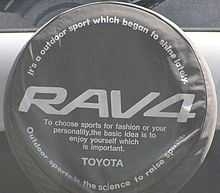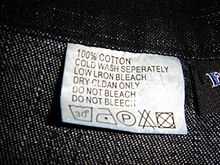Engrish



Engrish is a slang term for the misuse or corruption of the English language by native speakers of some East Asian languages.[1] The term itself relates to Japanese speakers' tendency to inadvertently substitute the English phonemes "R" and "L" for one another, because the Japanese language has one alveolar consonant in place for both. The related term "wasei-eigo" refers to pseudo-anglicisms that have entered into everyday Japanese.
While the term may refer to spoken English, it is more often used to describe written English. Engrish can be found in many places, including signs, menus, and advertisements. Terms such as Japanglish, Japlish or Janglish for Japan, Konglish for Korea, and Chinglish for China are more specific terms for Engrish.
Roots of the phenomenon
In Japanese Engrish, there are two contributing factors:
- First is the great difference between Japanese and English. Japanese word order, the frequent omission of subjects in Japanese, the absence of articles, a near-complete absence of consecutive consonants, as well as difficulties in distinguishing /l/ and /r/, or /th/ and /s/ sounds, all contribute to substantial problems using Standard English effectively.[2] Indeed, Japanese have tended to score comparatively poorly on international tests of English.[3]
- The second factor has been the use of English for "decorative" or "design" rather than functional purposes;[4] i.e., for Japanese consumption, not for English speakers per se, and as a way of appearing "smart, sophisticated and modern," in much the same way as Japanese and similar writing script is used in Western fashion.[5] Indeed, it is claimed that in such decorative English "there is often no attempt to try to get it right, nor do the vast majority of the Japanese population ever attempt to read the English design element in question. There is therefore less emphasis on spell checking and grammatical accuracy."[6]
In popular culture
Engrish features prominently in Japanese pop culture. Many popular Japanese songs and television-show themes feature disjointed phrases in English amongst the otherwise Japanese lyrics. Japanese marketing firms helped create this popularity, resulting in an enormous array of advertisements, products, and clothing marked with English phrases that seem amusing or bizarre to those proficient in English. These new Engrish terms are generally short-lived, as they are used more for fashion than meaning.
Instances of Engrish due to poor translation were frequently found in many early video games produced in Japan, often due to the creators not having enough (or just not wanting to spend enough) money for a proper translation. One well-known and popular example of Engrish in pop culture is the video game translation of Zero Wing which gave birth to the phenomenon All your base are belong to us, which also became an Internet meme.
Engrish has been featured occasionally in the Trey Parker and Matt Stone cartoon South Park, such as the song "Let's Fighting Love", used in the episode "Good Times with Weapons", which parodies the poorly translated opening theme sequences sometimes shown in anime, and in Parker and Stone's feature length Team America: World Police where the late North Korean leader Kim Jong Il is depicted singing the song "I'm so Ronery".[7]
The British fashion brand Superdry, in a reverse parody of the phenomenon, has established a style of placing meaningless Japanese text such as 'Sunglasses company' and 'membership certificate' on clothing sold in Britain. The company explained to a Japanese television crew that most translations were done using simple automatic translation programs such as Babelfish.[8][9]
See also
- Broken English
- Perception of /r/ and /l/ by Japanese speakers
- Lambdacism & Lallation
- All your base are belong to us
- Denglisch
- Faux Cyrillic
- Franglais
- Hinglish
- Hong Kong English
- Japanese Pidgin English
- Manglish
- Non-native pronunciations of English
- Runglish
- Singlish
- Spanglish
- Taglish
- Tinglish
- Wasei-eigo
- Finglish
References
- ↑ Ziemba, Christine N. (December 5, 2004). "Translate at your own risk". Los Angeles Times. Retrieved 13 June 2013.
- ↑ Dougill, John (2008). "Japan and English as an alien language" (PDF). English Today 24 (1): 18–22. doi:10.1017/S0266078408000059.
- ↑ Kowner, Rotem (2003). "Japanese Miscommunication with Foreigners: In Search for Valid Accounts and Effective Remedies" (PDF). Jahrbuch des Deutschen Instituts für Japanstudien 15: 117–151.
- ↑ Ikeshima, Jayne Hildebrand (July 2005). "Some perspectives on the phenomenon of "Engrish"" (PDF). Keio Journal of International Studies 15: 185–198.
- ↑ Dougill, John (1987). "English as a decorative language". English Today 3 (4): 33–35. doi:10.1017/S0266078400003126.
- ↑ Melin, Tracy; Rey, Nina (2005). "Emphasizing Foreign Language Use to International Marketing Students: A Situational Exercise That Mimics Real-World Challenges". Global Business Languages 10: 13–25.
- ↑ Stuever, Hank (October 15, 2004). "Puppet Government 'South Park' Creators' Left Jab at Jingoism May Backfire". Washington Post. Retrieved 16 September 2011.
The North Korean dictator speaks in the voice of "South Park's" Eric Cartman, ... only with an Engrish accent. "I'm so ronery", Kim confesses in a pitiful ballad to himself, which explains his evil-doing -- he just needs to be ruvved.
- ↑ "Superdry: Popular UK Fashion Brand Uses Gibberish Japanese". Japan Probe. Retrieved 1 October 2014.
- ↑ "Superdry". Unmissable Japan. Retrieved 2 October 2014.
External links
| Look up Engrish in Wiktionary, the free dictionary. |
| Wikimedia Commons has media related to Engrish. |
- Engrish.com—photos of Engrish from Japan, China and elsewhere
- fahruz.org—A private collection of Engrish and equivalents in French, German and Italian
- Large Engrish Photo Collection on Weird Asia News
- Engrish Funny—photos of Engrish from around the world
- Translation Party—an online tool that demonstrates how phrases are lost in translation between English and Japanese
| ||||||||||||||||||||||||||||||||||